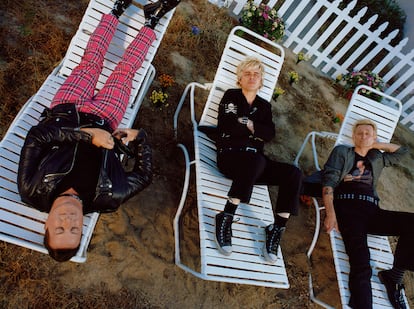The second coming of Green Day (and, with them, of pop-punk)
The return of the legendary group with ‘Saviors’ is the spearhead of the resurgence of the style they managed to impose in the 1990s and, against the odds, on the musical panorama

Pop has become a sensation-driven business, much like tennis. If you believe you’re going to make it, and if you make people believe — or your label and your marketing campaign make people believe — that you’re going to make it, you’re probably going to make it. Talent, technique, and inspiration are secondary to the ability to manufacture a favorable scenario. In the weeks leading up to the release of Saviors, Green Day’s 14th album, the machinery around one of the longest-running and most successful American pop-punk combos launched messages announcing a return to the punk spirit of their early years and the political engagement that marked their second coming in 2004 with the imperial success of their anti-Bush album, American Idiot.
In case appealing to nostalgia and promising a return to a gilded era wasn’t enough, for weeks we’ve been reminded again that Green Day’s sound, attitude, and even esthetic (if the latter exists) are very much in vogue. If you’re in your 30s or so, you know this because you listen to Olivia Rodrigo, Willow, Yungblud, or Machine Gun Kelly. If you’re over 30, because at some point in the last couple of years you’re likely to have seen Blink 182, Sum 41 or Simple Plan live. Oddly enough, if you’re the same age as the members of Green Day, there’s a good chance you haven’t heard any of this. The feeling has been instilled that this record is going to be a hit and the album, released on January 19 and produced by the legendary Ron Carvallo, clearly is.
Saviors kicks off with perhaps the most Green Day song Green Day has ever written. The American Dream Is Killing Me is a perfect compendium of the 1994 Dookie sound that made them superstars and the politics that defined American Idiot. It’s a great song. If this was still that band that played in a squat in Villareal, Spain, in front of 150 people — or in the La Báscula civic center in Barcelona in front of 50 — in the years before they signed to a major label, the other 14 tracks that make up the album would have been slight variations of this one and the result would have been countercultural, almost situationist. Magnificent and punk. But Green Day is too big a band and its members too old (the three permanent members are now in their fifties) to deliver an album featuring only accelerated bangers like Look Ma, No Brains!, playful melodies like the great Living in the ‘20s or top tier punk melancholy like Coma City. No one goes from touring the European squat circuit to being on MTV on that alone, not even in the far-off, idealized 1990s. Thus, the album must deliver its requisite dose of stadium rock, lighter ballads and borrowed half-pace melodies. In short, the same tactic that has reaped such good results whenever they have forgotten that distant ambition of theirs to have their own London Calling, or failing that, their Sandinista!
Legend has it that it all happened in just three weeks, in 1994. One night they were playing at the Garatge Club in Barcelona and, in the blink of an eye, they were presenting their candidacy for superstardom on the Woodstock stage. That was a strange year, perhaps the last one in which so many opposing musical subcultures coincided in full swing: the grunge of Soundgarden and Pearl Jam, the Britpop of Oasis and Blur, the trip-hop of Massive Attack and Portishead, or the foundation stones of modern hip-hop released that year by Nas and Beastie Boys. To top it all off, Kurt Cobain passed away in April. Although seemingly unconnected, all these albums and all these artists formed a perfect ecosystem of music scenes created to complement each other or, directly, as a reaction against them. But that last great coming together of genres had an unexpected and completely decontextualized guest: the pop-punk of Green Day.
With the solitary help of The Offspring, the sitcom version of Billy Joe Armstrong’s band, they had to find a place in the middle of that sea of sharks. Against all odds they succeeded, and that happened because the answer to the seriousness and nihilism of grunge that came in the form of Britpop never seduced American audiences, nor those who had suckled rock from the cradle. Then, as the need to degrease was still there and the public had discovered that, after all, they were not so eager to die in the Seattle rain, Green Day’s pop-punk fished in the seas where Blur and Oasis were shipwrecked.
Curiously, all the relevance that is sought from Green Day today has nothing to do with what happened 30 years ago, but with the great advent of pop-punk at the beginning of this century, the first great millennial catharsis. The era of American Pie, of homophobic jokes and that high school spirit that is said to have seduced Gen Z, who were robbed of those years by the pandemic and who now seek to recover them, either by making Simple Plan or Avril Lavigne songs go viral on TikTok, or by listening to Olivia Rodrigo — the real boss of all this and with whom Green Day have said they would like to collaborate — Willow or even some of the K-Pop bands like Tomorrow X Together, who have embraced this sound and this way of understanding life and trouser width.
While Blink 182 has had to deconstruct itself because — if the kids think Friends was offensive they were surely going to freak out at some of their lyrics — the new generation of pop-punk artists already know that you don’t make fart jokes, and not because they imply trivializing climate change. They don’t make fart jokes because they simply aren’t funny. A revival is not only nostalgia, it can also be correction.
Sign up for our weekly newsletter to get more English-language news coverage from EL PAÍS USA Edition
Tu suscripción se está usando en otro dispositivo
¿Quieres añadir otro usuario a tu suscripción?
Si continúas leyendo en este dispositivo, no se podrá leer en el otro.
FlechaTu suscripción se está usando en otro dispositivo y solo puedes acceder a EL PAÍS desde un dispositivo a la vez.
Si quieres compartir tu cuenta, cambia tu suscripción a la modalidad Premium, así podrás añadir otro usuario. Cada uno accederá con su propia cuenta de email, lo que os permitirá personalizar vuestra experiencia en EL PAÍS.
¿Tienes una suscripción de empresa? Accede aquí para contratar más cuentas.
En el caso de no saber quién está usando tu cuenta, te recomendamos cambiar tu contraseña aquí.
Si decides continuar compartiendo tu cuenta, este mensaje se mostrará en tu dispositivo y en el de la otra persona que está usando tu cuenta de forma indefinida, afectando a tu experiencia de lectura. Puedes consultar aquí los términos y condiciones de la suscripción digital.









































